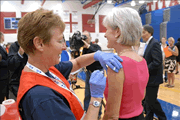NIH
Statement on Preliminary Results from Clinical Trials of H1N1 Influenza Vaccines
 | Research
teams in various countries have recently reported favorable early results from
clinical trials of vaccines against the novel 2009 H1N1
influenza A ("swine flu"). The National Institutes of Health (NIH) last week
issued a statement about these trial results and their potential implications
for public health efforts to control the ongoing pandemic. Results to date suggest
that a single vaccine dose -- rather than the expected 2 doses -- may confer adequate
protection, which would allow more people to be vaccinated given limited supplies. |
|
NIH STATEMENT
Early
Results from Clinical Trials of 2009 H1N1 Influenza
Vaccines in Healthy Adults  | | Secretary
Sebelius gets her seasonal flu shot. |
|
We
are encouraged by reports that are now emerging from various clinical trials of
2009 H1N1 influenza vaccines, conducted by various vaccine manufacturers. We expect
additional companies to announce their preliminary trial results shortly.
The
early data from these trials indicate that 2009 H1N1 influenza vaccines are well
tolerated and induce a strong immune response in most healthy adults when administered
in a single unadjuvanted 15-microgram dose. We congratulate the companies on these
trials, which are an important part of the ongoing worldwide effort to develop
vaccines to protect the public from 2009 H1N1 influenza.
The National
Institute of Allergy and Infectious Diseases (NIAID), part of the National Institutes
of Health, also is conducting clinical trials of 2009 H1N1 influenza vaccines,
produced by Sanofi Pasteur and CSL Limited. The NIAID trials are testing two different
dosages (15 micrograms versus 30 micrograms) and evaluating the immune response
to one and two doses of these vaccines. More than 2,800 people are participating
in ongoing NIAID trials of these vaccines.
We are pleased to note that
preliminary analyses of early data from the NIAID trials align with the recently
announced findings and those to be announced imminently by other companies in
that both vaccines studied induced what is likely to be a protective immune response
in most adults following a single dose in the same amount (15 micrograms) used
in seasonal flu vaccines. Specifically, in blood samples obtained 8 to 10 days
after vaccination:
Among healthy adults who received a single 15-microgram dose of the Sanofi Pasteur
vaccine, a robust immune response was measured in 96 percent of adults aged 18
to 64 and in 56 percent of adults aged 65 and older.
Similarly, among
healthy adults who received a single 15-microgram dose of the CSL Limited vaccine,
a robust immune response was measured in 80 percent of adults aged 18 to 64 and
in 60 percent of adults aged 65 and older.
Additional
data from the NAID trials are forthcoming. However, on the basis of these strong
early data, our results are consonant with other reports that a single 15-microgram
dose of unadjuvanted 2009 H1N1 influenza vaccine is well tolerated and induces
a robust immune response in healthy adults between the ages of 18 and 64. For
adults aged 65 and older, the immune response to 2009 H1N1 influenza vaccine is
somewhat less robust, as is the case with seasonal influenza vaccines.
We
note that the slight discrepancies seen in our trials between the Sanofi Pasteur
and CSL Limited vaccines may be due to technical differences in the preliminary
measurement of the amounts of antigen in the doses used in the clinical trial
lots and the relatively limited numbers of samples studied to date, as well as
the fact that our data are drawn from a very early time point after immunization.
NIAID will continue to provide timely updates on these trials as well
as those in children and in pregnant women, which began later. We will join colleagues
from across HHS [Department of Health and Human Services] for the weekly H1N1
briefing to be held this week at HHS on Friday at 1:00 PM. The briefing will be
shown live at www.flu.gov. [Ed.
Note: an archived video of the September 11 briefing is now available at this
web site.]
Information from the NIAID studies will help inform the
development of recommendations for immunization schedules, including the optimal
dosage and number of doses for different age groups.
NIAID is conducting
these clinical trials through its longstanding vaccine clinical trials infrastructure,
the Vaccine and Treatment Evaluation Units, a network of medical centers that
offers rapid response capability to test vaccines for emerging public health concerns.
Detailed information is available from the NIAID Web site and from http://ClinicalTrials.gov.
9/15/09
Source
U.S.
Department of Health and Human Services. Early Results from Clinical Trials of
2009 H1N1 Influenza Vaccines in Healthy Adults. September 11, 2009. |